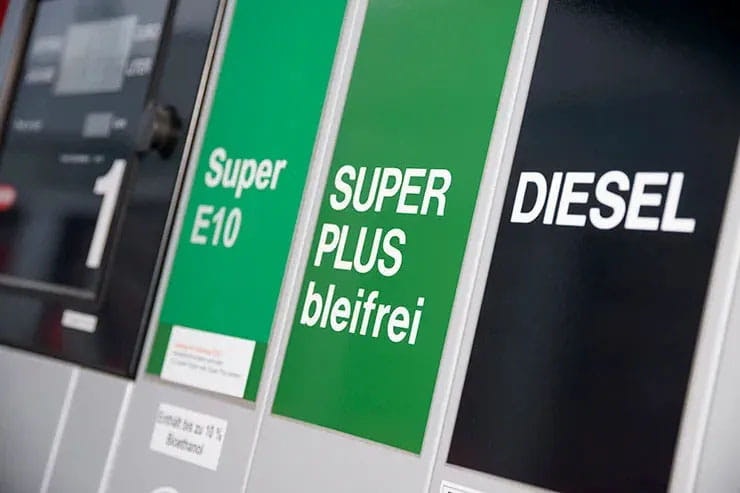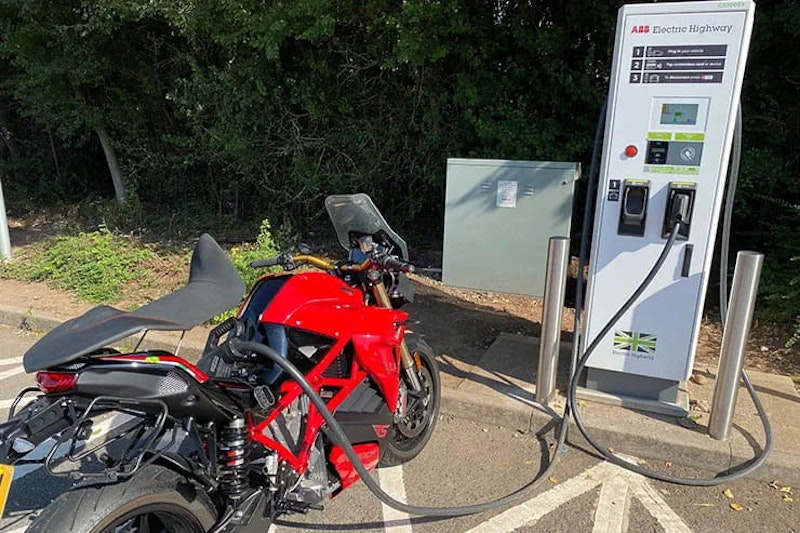Motorcycle industry unites against combustion engine ban plans
By Ben Purvis
Motorcycle Journalist
03.10.2022
Towards the end of September the Government's consultation into 'ending sales of non-zero emissions' motorcycles by 2035 at the latest came to a close and while we'll have to wait to see its results there's a clear message from the motorcycle industry that the plan to shift entirely to battery power closes the door on green combustion engine technologies that could also achieve net-zero carbon goals.
The Government's definition of a 'non-zero emission vehicle' is one that will "produce harmful exhaust air emissions while driving. These include greenhouse gases, such as carbon dioxide, and pollutants, such as nitrogen dioxide." Essentially, it means that any form of combustion engine would be unviable. Even combustion engines using hydrogen as fuel, where the main by-product is H2O – water – rather than CO2 (carbon dioxide), eliminating the greenhouse gas emissions that are driving climate change, will have trace emissions of oxides of nitrogen. Similarly, net-zero fuels – those that extract as much CO2 from the air during their production as they emit when burnt to leave no overall negative impact on greenhouse gas levels, for example biofuels or synthetic eFuels – would also be unviable.
While the 'zero-emissions' nature of battery power is superficially tempting on that front, the plan to make all new bikes battery-powered fails to account for the potential environmental damage involved in manufacturing or charging those batteries. An electric motorcycle might leave no emissions behind from its motive power (although there are still particulate emission from tyre and brake wear, which are increasingly being seen as a substantial problem), but if the electricity comes from a coal-fired power station or manufacturing the battery involves extensive mining and the shipping of materials all over the globe, there's still potential for plenty of environmental damage.
In response to the Government's consultation, which wants to see bikes up to 125cc off sale by 2030 and replaced by electric alternatives, with larger-engined models disappearing from showrooms just five years after that, the National Motorcycle Council has called for a broader approach to net zero, leaving the door open to carbon-neutral combustion engines rather than committing purely to battery power. The NMC said: "The Council does not support arbitrary UK only targets for ending the sale of new non-zero emission motorcycles and believes that the UK should instead move towards net-zero goals on the basis of internationally agreed targets and strategies, working with both motorcycle riders and the industry to develop an approach which is in line with the Prime Minister's statement to Parliament on September 8th that Government policy should "… ensure we deliver net zero by 2050 in a way that is pro-business and pro-growth.""
The NMC goes on to explain: "The NMC believes that all technologies and innovations should be 'in play' – including clean and synthetic fuels – and not just battery electric only. The Government needs to demonstrate more ambition through supporting innovation in these areas, rather than restricting development to just the one narrow pathway of battery electric. The Government is called upon to take a genuinely technology neutral approach. The move towards net zero is a matter which is too technologically detailed to restrict it to battery electrification only. Imposing specific technologies means limiting choice and therefore creating a constraint on innovation.
"Motorcycle manufacture is a global, not local, matter. As a result, the UK must move to globally agreed strategies for net-zero and not introduce arbitrary national timetables in advance of these, which will make little difference to the global CO2 picture in any case. Such an approach could likely lead to market and economic shocks in the UK, including, potentially, market withdrawal by the global manufacturers."
The NMC's director, Craig Carey Clinch, said: "Successful transition in any field requires those affected to be content with changes proposed. In the case of zero emission motorcycles, particularly in the premium motorcycle market, current product availability, it's suitability for the wide range of rider needs, prices and current low market penetration, suggests that much more will need to be done before a reasonable target date for full zero emission new production can be established.
"Although riders are willing to try new technologies, if products don't meet their needs, the market will be severely impacted. Therefore, it is clear that a different regulatory approach will be needed which recognises where electrification works for the market and where it currently poses challenges which cannot be ignored.
"The Government should show more ambition in this area. Net zero should not mean the end of the internal combustion engine, but instead we should be looking towards a 'mixed economy' of battery electric, clean ICE fuels and other types of technology, with current motorcycle types properly recognised from now as a lower CO2 transport choice. Innovation should be encouraged and not restricted to narrow pathways."
On a wider scale, the motorcycle industry's reaction to plans for net zero carbon emissions mirrors that of the NMC, with many companies backing the idea of synthetic fuels or hydrogen power rather than putting all their eggs into the battery-electric basket.
ACEM, the European Association of Motorcycle Manufacturers, has published a paper – 'Bridging the gap to climate neutrality' – that puts net-zero eFuels at its heart in response to EU plans for net zero carbon emissions by 2050. The paper says: "For the EU to achieve the ambitious goal of net zero carbon emissions, ACEM members are committed to delivering L-category vehicles that contribute to the decarbonisation of transport in a sustainable timeframe which supports jobs, growth and the environment. As such, our industry ambition, based on the "right vehicle, right place, right energy carrier" concept, is to continue to offer the market a variety of powertrains, each of which will contribute to decarbonisation."
It goes on to explain: "eFuel, in particular, should be developed with a production volume that supports decarbonisation of the existing fleet of traditional ICE vehicles and for products for which electrification is not expected to be possible in the medium to long term (e.g. products used for long-distance commuting and travelling in remote areas)."
ACEM's list of benefits of eFuels includes a host of points, including the facts that they're climate-neutral, that they don't have the disposal and recycling problems of batteries and – perhaps most significantly – they are compatible with existing bikes and infrastructure. In short, rather than replacing your bike with an expensive, resource-draining electric alternative, you could have a net-zero machine already in your garage if there was a ready supply of eFuel to use instead of petrol.
Share on social media:

